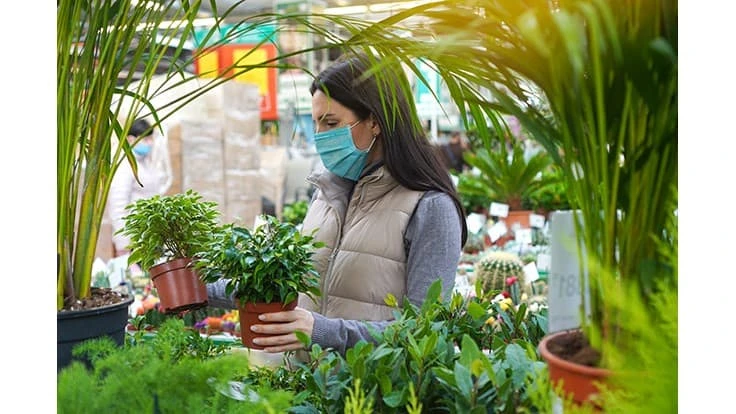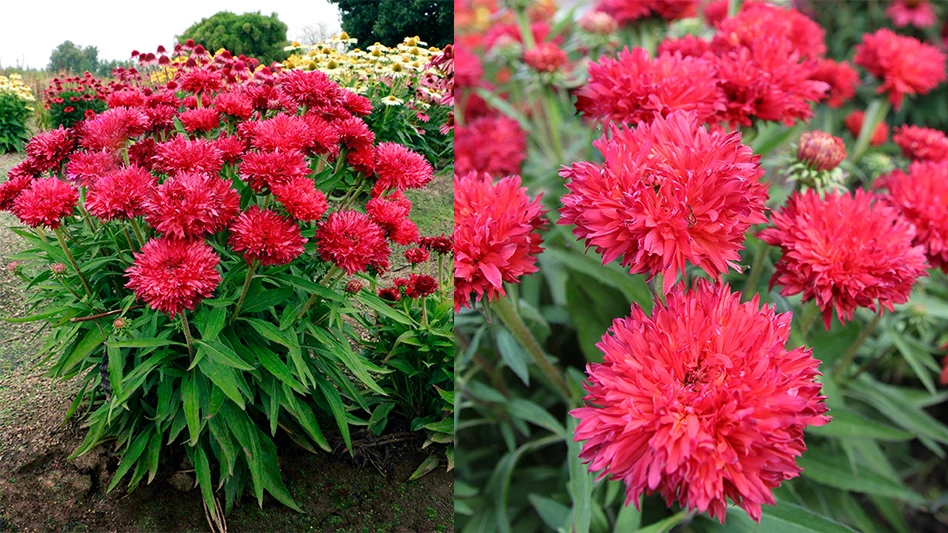
Photo © Dmytro I Adobe Stock
As the COVID-19 gardening craze continues to pull in more and sales and customers than in years past, Mother’s Day 2021 was a record-breaker. Heather Pariso, owner of The Garden Gurl Shop in New Philadelphia, Ohio, reported that her sales were up compared to last year, despite the “absolutely treacherous” weather.
“Air plants and houseplants have been the two most popular items this year," she says. "I have gone through more air plants and houseplants than ever before. For Mother's Day, those were just flying out the door, as well as porch pots.”
Pariso created one-of-a-kind succulent arrangements for $10 to $15 apiece. She was able to offer these as gifts for both National Teacher Appreciation Week, May 3-7, and Mother’s Day, May 8. She also offered a free paint station for kids, where they could paint pots for their moms on Saturday and Sunday.
The Garden Gurl Shop is situated mostly outdoors, along with an open, indoor garage area and greenhouse where customers can shop and take seasonal classes, since she’s only open for the spring, fall and winter seasons. Her open setup made it easier when COVID hit, and customers could easily follow social distancing rules and other CDC protocols.
Customers started trickling in on Friday, but the garden center was slammed on Saturday. She was also open for three hours on Sunday to catch what she calls the “Last Minute Loueys.” Pariso’s garden center is open Wednesday through Sunday, 11 a.m. to 6 p.m. since she runs the shop, about a half-acre in size, by herself. Often, friends and family will jump in and help out.
As the weather was so cold and windy, the expectation of foot traffic wasn’t there, she says. So decided to handle the shop by herself on Mother’s Day, without assistance.
“That was a bad idea,” Pariso laughs. “The kids were coming in, painting the pots and then you had their parents shopping. Sales were almost $800 in three hours.”
For the spring season alone, she notes that her sales doubled last year due to the coronavirus, and this year they’ve jumped even beyond that — nearly up 20% to 30%, every single day.
“I think the biggest thing was just, even with coronavirus and all the stuff going on, I just wanted everybody to be able to come here and chill, laugh and relax. Especially after this long winter we had. People couldn't wait to dig in the dirt,” she says.
Social media-savvy
At Lichtenfelt Nurseries, located in Greenville, South Carolina, sales were also up 50% over last year, says owner Connor Lichtenfelt, who runs the garden center with his wife, Courtnie.
“The transaction count was almost identical, but our average ticket was almost $40 more net per ticket,” he says.
Color items, roses, hydrangeas and butterfly bush were huge sellers this year. He says their perennial manager created colorful vignettes customers could grab, which were displayed up front. Pottery and indoor container sales were up too.
“We staged some different things inside the containers where we’d stick houseplants that were still in their nursery containers inside the pot. We set it inside and many people bought both as a pairing,” he says.
He says their POS system, Shopify, helped them group and link products together, so they created a link (https://lichtenfelts.com/collections/mom) for their Mother’s Day collection, which they promoted on social media before the holiday.
They also debuted a Mother’s Day video on social media, in which Lichtenfelt walked around the nursery with his mother, who co-founded the business with his father. The video was a nice way to showcase the history of the business, and it didn’t cost a lot of overhead to make, he says.
Customers were out in full force, and he estimates that traffic was the same as last year, due to the large space of their business, which is entirely outdoors.
He notes that supply shortages have been a challenge. They sold a lot of annuals for Mother’s Day, but says they’ve been much harder to come by, along with other in-demand items, like shrubs.
The economic COVID crisis and the winter storms in Texas, which wiped out thousands of crops, have been a challenge for the industry. “A lot of nurseries lost everything due to the Texas freeze, so they're having to buy full new inventories, and that kind of exacerbated the shortages,” he says.
As garden centers and nurseries deal with shortages, there are some tactics they can use to get customers back in the door. “For items that were out of stock, we suggested gift card because then you could make a day trip out of it, come out to the nursery with mom and you can buy something with her,” he says.
As a result, gift card sales were up. He estimates they sold 20 in one day, which is pretty uncommon.
Impact of shortages
Over at Ganim’s Garden Center & Florist in Fairfield, Connecticut, owner Lee Ganim says the weather was cooler than anticipated, but sales were high, and customers were in a stocking frenzy.
“No one thing was popular this year — everything went. They were picking at all the different departments, including tropicals, bedding plants, hanging baskets, vegetables, fertilizer,” he says.
Ganim says they are the only dealer in Fairfield County that sells Bumper Crop products, a Master Nursery brand, which was another popular draw for Mother’s Day.
“People just came out. I think we have a different kind of clientele than most of the box stores do. We always say that they have customers, and we have gardeners. That's been a big promotion item for us,” he says.
As more of the public becomes vaccinated and COVID cases decline, more people are venturing out and starting to safely resume activities. Ganim says there was an increase in foot traffic compared to last year, and there were also fewer restrictions by the state.
They carry a large variety of nursery stock. Like Lichtenfelt’s, he says it has been a challenge to obtain inventory this year.
Ganim believes that many nurseries oversold in the fall due to the explosion of demand, and garden centers in warmer climates were able to obtain more stock than garden centers in colder climates.
“Most people don't realize how long it takes to grow woody plants, trees or shrubs, which can take five to seven years. They think it's like the Amazon effect, where they can click on it and it will be there tomorrow. And it doesn't happen that way in the nursery world,” he says.
Ganim says he was more worried about 2021 than 2020, as he was unsure of how many new gardeners would return. Luckily, the demand remains, but it’s a matter of supply. Truck driver shortages and an overall shortage of labor and high unemployment are additional factors the industry must contend with, he says.
According to a report from Beroe Inc., a provider of procurement intelligence and supplier compliance solutions, 63,000 truck-driving jobs are currently vacant. The report predicts that the global tanker market will need 174,000 new truckers by 2026 — an even higher shortage that will further hike up rates.
“I've been doing this 53 years. This is the most challenging year I've ever had. You have to get your crystal ball out of say, ‘Well, what am I really going to need next week before they run out of it?’ And that's scary because they have such an impulse of material going out in huge numbers that these guys can't even keep up their availability,” he says.
He predicts that next year they’ll have half the amount of nursery stock that they had this year. While he’s grateful for the demand, he says the pandemic will affect the business for a long time.
Latest from Greenhouse Management
- Grant awarded to test western U.S. wood species for use as wood fiber potting substrate
- Pennsylvania Horticultural Society announces 2025 Gold Medal Plant winners
- Oasis Grower Solutions announces new Southeast territory sales manager
- A nation of gardeners: A history of the British horticulture industry
- Last Word with Angela Labrum, Bailey Nurseries
- Iowa plant supplier Plantpeddler building retail complex
- This month's Greenhouse Management magazine is about native plants and sustainability
- The HC Companies, Classic Home & Garden merge as Growscape





